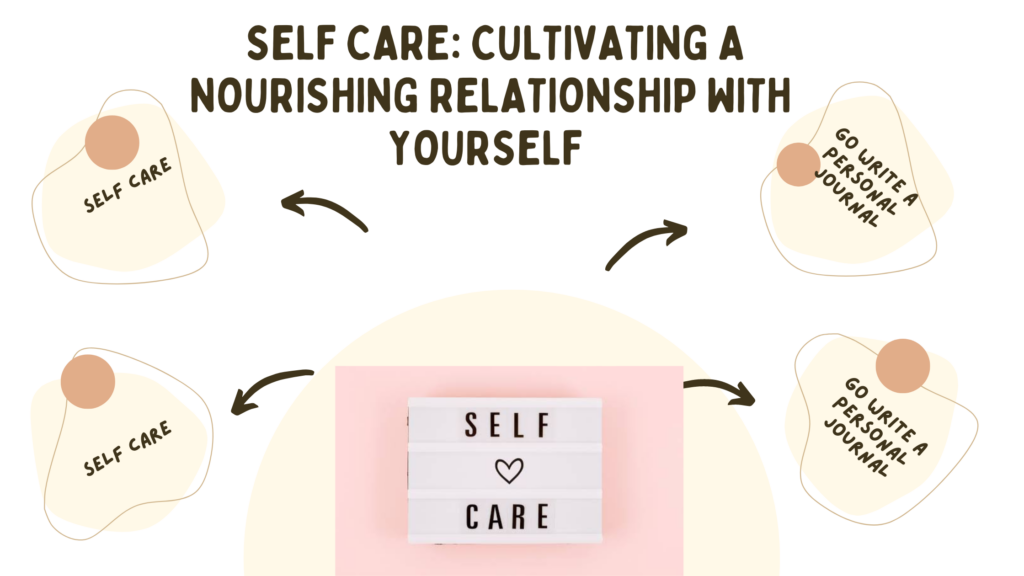Making time for self-care and personal growth can be challenging in our fast-paced world. Yet, an uncomplicated yet impactful technique exists in journaling. This practice goes beyond noting daily events; it is a transformative tool harnessing self-care and personal growth potential. Journaling lies in offering clarity, emotional processing, and self/life insights. Additionally, it aids in goal setting, progress tracking, and motivation.
So, what is journaling? It is the act of structurally documenting thoughts, feelings, and experiences. It comes in various forms, like diaries, bullet journals, or digital entries. Its versatility lies in reflecting on the past, processing emotions, and fostering self-awareness. It is also a tool for goal setting, progress monitoring, and motivation enhancement.
Follow our CEO here!
Journaling: Your Gateway to Self-Discovery:
Journaling is not just about writing; it is a transformative practice that opens a doorway into your inner world. By putting your thoughts, emotions, and dreams onto paper, you start to navigate the intricate landscape of your mind. Over time, patterns in your actions and feelings become apparent, offering insights into areas where personal growth is possible. This journey of self-reflection fosters self-awareness and development, unveiling the captivating and sometimes bewildering realms of your psyche.
Benefits of Journaling: Nurturing Your Mind, Body, and Soul:
The benefits of journaling are extensive and impactful. Particularly for female entrepreneurs, it can prove transformative, offering a platform to define objectives, formulate strategies, and convey the emotional aspects tied to their business ventures. Journaling provides a range of benefits: aiding in progress monitoring, recognizing trends, and addressing obstacles. It fosters introspection, improves emotional health, and establishes a secure outlet for idea exploration and innovative thinking, thereby contributing to a well-rounded growth of the individual on mental, physical, and spiritual levels.
Self-Care: Cultivating a Nourishing Relationship with Yourself:

Self-care is crucial for maintaining balance in our hectic lives. Journaling serves as a self-care method, enabling introspection, acknowledging achievements, and promoting self-kindness during tough times. This practice holds significant power. Reflecting on our thoughts and experiences fosters introspection, unraveling emotions, and understanding oneself. It also aids in recognizing patterns and emotions, promoting self-awareness. Noting down even minor achievements enhances self-esteem and reinforces progress reminders.
During difficult moments, your journal becomes a compassionate friend, offering you a platform to express your challenges and emotions without judgment. Overall, journaling can truly foster a more nourishing and compassionate relationship with yourself.
Morning Pages and The Artist’s Way:
Morning Pages, made popular by Julia Cameron’s book “The Artist’s Way,” involve the practice of stream-of-consciousness writing immediately upon waking. It is a tool that sets a positive tone for the day, declutters the mind, and boosts creativity.
For anyone seeking enhanced creativity and productivity, Morning Pages are a potent technique. By jotting down thoughts and emotions upon waking, a clear mindset and purposeful start to the day can be achieved. This practice aids in recognizing and addressing personal obstacles while also framing goals and intentions. Moreover, it provides a channel for self-expression and creative exploration.
The mechanics of Morning Pages are simple: dedicate a few minutes each morning to write whatever comes to mind. It is an unstructured process—worries, dreams, or anything in between. Honesty and openness are paramount.
In essence, Morning Pages are an exceptional way to launch the day. They clear the mind, set intentions, and foster creativity and productivity. Why not give it a shot?
The Science Behind Journaling: Validating Its Impact:
Scientific research confirms the positive impact of journaling on both mental and physical well-being. Journaling is recognized for its potential to bring about psychological and emotional advantages. Studies indicate that consistent journaling can effectively lower stress levels, elevate emotional wellness, and foster self-awareness. By engaging in introspection, individuals can gain valuable insights, effectively navigate their emotions, and achieve better self-awareness. However, it’s essential to acknowledge that the effectiveness of journaling can vary depending on personal preferences and goals.
Mindfulness: Enhancing Your Present-Moment Awareness:
Journaling offers a meditative journey, immersing you in the present. Through writing, mindfulness of thoughts and emotions grows, cultivating a profound self and environment connection. It is an excellent practice for developing mindfulness and emotional intelligence. By labeling emotions in writing, individuals can better understand their feelings and gain insights into their thought patterns. This process can lead to improved self-awareness and the ability to manage emotions effectively.
Labeling Emotions: A Path to Emotional Regulation:

When faced with challenging emotions, labeling them in your journal can provide clarity and help you better understand your reactions. This practice can be especially beneficial during traumatic events, offering a safe outlet for processing emotions.
Journaling can be a powerful tool for emotional regulation. By labeling our emotions, we can gain insight into our reactions and better understand our feelings. Engaging in this technique proves particularly valuable in challenging periods, offering a secure outlet for emotional processing. Jotting down our sentiments aids in pinpointing behavioral trends and identifying emotional triggers. Additionally, it fosters the development of healthier coping mechanisms and enhances emotional management. Through the practice of categorizing our emotions, we attain enhanced self-awareness, leading to more effective emotional control.
Talk Therapy and Writing Therapy: Complementary Approaches:
Think of journaling as the whisper that echoes the therapy’s revelations, an amplifier for those “a-ha” moments. Now, writing therapy that’s like a journey to the core of your emotions, a cosmic exploration of self. It’s not just writing; it’s your emotions’ canvas, where the colors of healing and growth bleed together.
Writing therapy, a sort of emotional spelunking, nudges individuals to step into the labyrinth of their minds fearlessly. Think of it as an expedition where words hold hands with emotions, venturing into the depths of your psyche. It’s a sanctuary of expression, a space where judgment’s barred from entry.
This therapy’s like a compass for the heart, pointing out emotions’ north star. It’s a treasure map, revealing the path through the labyrinth of emotions, where insight gleams like hidden treasure. It’s a toolkit for grappling with life’s curveballs, a toolbox filled with coping strategies that you assemble yourself.
But there’s more: writing therapy is a crucible of emotion, a cauldron where grief, anger, and fear mix and meld, turning into understanding and release. It’s a blueprint for dreams, a launchpad for aspirations yet unspoken. It’s like sculpting your future, chiseling your goals into existence, and then plotting your course to reach them.
And the grand finale? Writing therapy spins a mirror, reflecting your soul at you, fostering self-awareness that’s both dazzling and humbling. It’s a self-hug, a whispered assurance that you’re okay, just as you are. So, talk therapy and writing therapy, an orchestra of healing, a masterpiece of the self.
Organizational System: Creating Structure Amidst Chaos:
The act of journaling offers a powerful method for female entrepreneurs to bring structure to their lives. By capturing tasks, ideas, and plans on paper, they create a tangible record that helps them manage their responsibilities. This process not only maintains a clear vision but also acts as a compass guiding them toward their goals. Amidst the inevitable chaos that life often presents, this practice provides a stable foundation, allowing entrepreneurs to remain organized and on track, even when faced with increasing complexities and uncertainties.
Working Memory: Sharpening Your Cognitive Abilities:
Working memory is a vital part of cognitive function, holding and manipulating information for tasks. Keeping a journal can help boost working memory. When you write down important details, thoughts, or tasks, you’re easing the mental load on paper. This frees up mental space, letting you focus on tasks without fear of forgetting vital information.
Regular journaling exercises your working memory, enhancing your ability to process and organize information. This leads to better problem-solving and decision-making. With an improved working memory, you excel at connecting information, spotting patterns, and finding creative solutions.
Journaling also promotes mindfulness and reflection, contributing to cognitive growth. Reviewing entries reinforces the memory of past events, honing cognitive abilities. This empowers you to handle complex situations adeptly and make informed choices backed by structured thinking.
Socializing and Brain Drain: Balancing Connectivity:
While technology facilitates socializing, it can also lead to information overload and “brain drain.” Journaling offers a balance by allowing you to disconnect, engage in self-reflection, and recharge your mental batteries. Finding a balance between staying connected through technology and taking breaks for self-reflection is crucial for maintaining mental well-being and avoiding information overload. Journaling can indeed be a helpful practice to disconnect and recharge.
Expressive Writing: A Cathartic Experience:

Expressive writing in your journal can be a cathartic experience, providing emotional release and reducing stress levels. By expressing emotion freely on paper, you can unburden your mind and foster emotional well-being. Expressive writing is a powerful tool. Writing enables you to express your thoughts and emotions on paper, aiding in processing feelings and gaining insights. This can bring relief and enhance emotional well-being over time.
Focused Journal Writing: Channeling Intentions for Growth:
Focused journal writing is a transformative practice, allowing you to articulate precise intentions and monitor your advancement. As you record your ambitions and evaluate your journey, you effectively guide your life along a path that resonates with your core principles and aspirations. This technique possesses significant potential to foster personal development. Through the process of refining your intentions and consistently pondering your advancement, you enhance your odds of adhering to the trajectory leading to your sought-after objectives and cherished values. Consequently, it presents an excellent avenue to channel your cognitive processes and behaviors with a sense of deliberate purpose.
Life Course Correction: Embracing Change with Grace:
Life is full of uncertainties and changes, but journaling can help you navigate these transitions with grace. By reflecting on past experiences, you can identify areas for improvement and make positive course corrections. In the journey of life, where uncertainties and changes are inevitable, embracing them with grace becomes a valuable skill. Journaling offers a powerful tool to navigate these transitions. Through introspection and reflection on past experiences, you gain insights into your reactions, decisions, and outcomes. This process allows you to identify patterns, both positive and negative, that have shaped your life.
By recognizing areas for improvement, journaling helps you make conscious and positive course corrections. It enables you to set goals that align with your evolving values and aspirations. This practice fosters self-awareness, helping you understand your emotions, motivations, and triggers. Armed with this knowledge, you can approach change with a more composed and adaptable mindset.
Journaling Techniques for Techies: Laptop vs. Handwriting:
In today’s digital age, techies often prefer laptop journaling due to convenience and speed. Combining both laptop and handwriting journaling techniques can provide a well-rounded experience for techies. While laptops offer convenience and speed, handwriting brings cognitive benefits that can enhance creativity and memory retention.
Laptop journaling allows techies to quickly jot down their thoughts, ideas, and reflections. The digital format enables easy organization, searchability, and access from anywhere. This is particularly advantageous for those who prefer typing or have a lot of information to capture efficiently. On the other hand, handwriting journaling taps into a different realm of cognitive processes. The act of physically writing engages different areas of the brain, promoting deeper thinking and reflection. It’s a slower process that encourages focused thought, allowing techies to explore their ideas more thoroughly. Handwritten notes can also be accompanied by sketches and doodles, which can aid in visualizing concepts.
Color-Coded Pens: Adding Creativity to Your Journal:
Color-coded pens can elevate your journaling with creativity and organization. Using different colors to categorize your entries brings visual appeal to your thoughts. Assign colors to categories like blue for personal reflections, red for events, green for goals, etc. This makes finding content easy and adds vibrancy to your journal. Color coding aids memory by associating colors with content types, aiding reflection and goal tracking. It’s also therapeutic, as colors linked to emotions deepen your connection to your entries, adding depth and meaning.
Journaling Frequency: Consistency for Lasting Impact:
Choosing how often to journal is a personal decision, but the key lies in maintaining consistency. Whether you opt for daily, weekly, or monthly entries, establishing a routine ensures that you harness the enduring benefits of self-reflection and personal development. Consistency in journaling is pivotal for experiencing long-lasting advantages. Establishing a steady routine, whether it’s on a daily, weekly, or monthly basis, fosters a pattern that allows you to systematically delve into your thoughts, feelings, and life events.
By engaging in regular journaling, you provide yourself with a dedicated opportunity to reflect on your accomplishments, challenges, and dreams.
This continual introspection aids in monitoring your progress, recognizing trends, and gaining insights into your actions and thought patterns. It is within this ongoing self-examination that you can pinpoint areas for enhancement and define meaningful objectives for your journey of self-improvement.
Conclusion:
Discover the profound impact of incorporating journaling into your daily routine. This blog post reveals the wide-ranging benefits of journaling, particularly empowering female entrepreneurs. From morning pages to expressive writing, these techniques offer abundant opportunities to foster mindfulness, memory, communication skills, and emotional well-being. Through journaling, you’ll forge a stronger connection with yourself, better handle life’s obstacles, and embrace personal growth gracefully. Get ready to start this rewarding journey toward a more balanced, fulfilling, and empowered life by embracing the art of journaling with your favorite journal and pens.
Other articles you will love:
Effective Goal Setting Strategies for Women Who Lead
10 Productivity Hacks for Female Entrepreneurs: Achieve More in Less Time
Follow our CEO here

